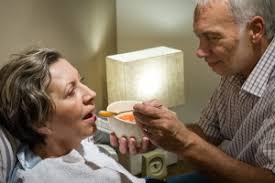Persons with Disabilities and Seniors Want to Remain at Home with Their Families
Developing a disability can happen to anyone and at any age. At present, Medicaid is the primary payer for long-term services and supports (LTSS). Virtually everyone prefers to receive care in a home and community setting rather than at an institution, such as a nursing home. Permanent separation from your spouse due to a disability can be a traumatic event for the family. Home and community-based services (HCBS) – through state Medicaid “Waiver” programs – also cost less on average than in institutional care. Federal Medicaid law mandates coverage for institutional care, but makes HCBS programs optional for states.
Overview of Spousal Impoverishment Protections
Thirty years ago, Congress created a myriad of protections to prevent a spouse from depleting all of their financial resources due to their significant others’ long-term care needs. Unfortunately, those protections were mandated for nursing home coverage, but made optional for HCBS. These “spousal impoverishment” protections included:
- A Community Spouse Resource Allowance. While the institutionalized spouse may have no more than $4,000 in savings and countable assets in order to qualify for Medicaid in Mississippi, Federal law mandates that states allow the community spouse to retain a modest amount of their assets at the time of application to cover basic living and health expenses. This is called the “community spouse resource allowance (CSRA).” In 2019, the community spouse may retain $126,420 in countable resources at the time of the spouse’s application.
- Exclusion of a Community Spouse’s Income. Medicaid does not count the community spouse’s income when determining whether the institutionalized spouse is eligible for Medicaid. However, in some states, if the community spouse’s income exceeds a certain threshold, he or she may be liable for court-ordered support for the cost of the sick spouse’s care.
- Minimum Monthly Needs Allowance. The community spouse is also entitled to a minimum monthly maintenance needs allowance (MMMNA). In 2019, this amount is $3,160.50 a month. If the community spouse’s income is below the MMMNA limit, then the institutionalized spouse’s income can be transferred to the community spouse and used to supplement the difference.
In 2010, Congress for the first time temporarily mandated that HCBS waivers include spousal impoverishment protections. The mandate is set to expire at the end of 2018.
Ending the Mandate Spousal Protections for HCBS Could Cause More Unnecessary Institutionalization
Mandating spousal impoverishment protections for HCBS services in at-home settings, not just institutions, helps to ensure that families can stay together when someone requires long-term care. If forced to choose between impoverishing their spouse because of the cost of paying out-of-pocket for HCBS, and separating from them to become institutionalized, a person with a disability may feel they have no choice but to institutionalize themselves. The National Academy of Elder Law Attorneys (NAELA) is undertaking efforts to urge Congress to make these spousal protections a permanent feature of the Medicaid program before it expires at the end of the year. NAELA will also ask that Congress clarify that these protections do not restrict a state’s ability to apply the methodology that treats spousal assets as unavailable for the purposes of qualifying for a Medicaid HCBS waiver.
If you have questions about Medicaid HCBS Waiver programs to provide care, call Courtney Elder Law Associates today at 601-987-3000.
